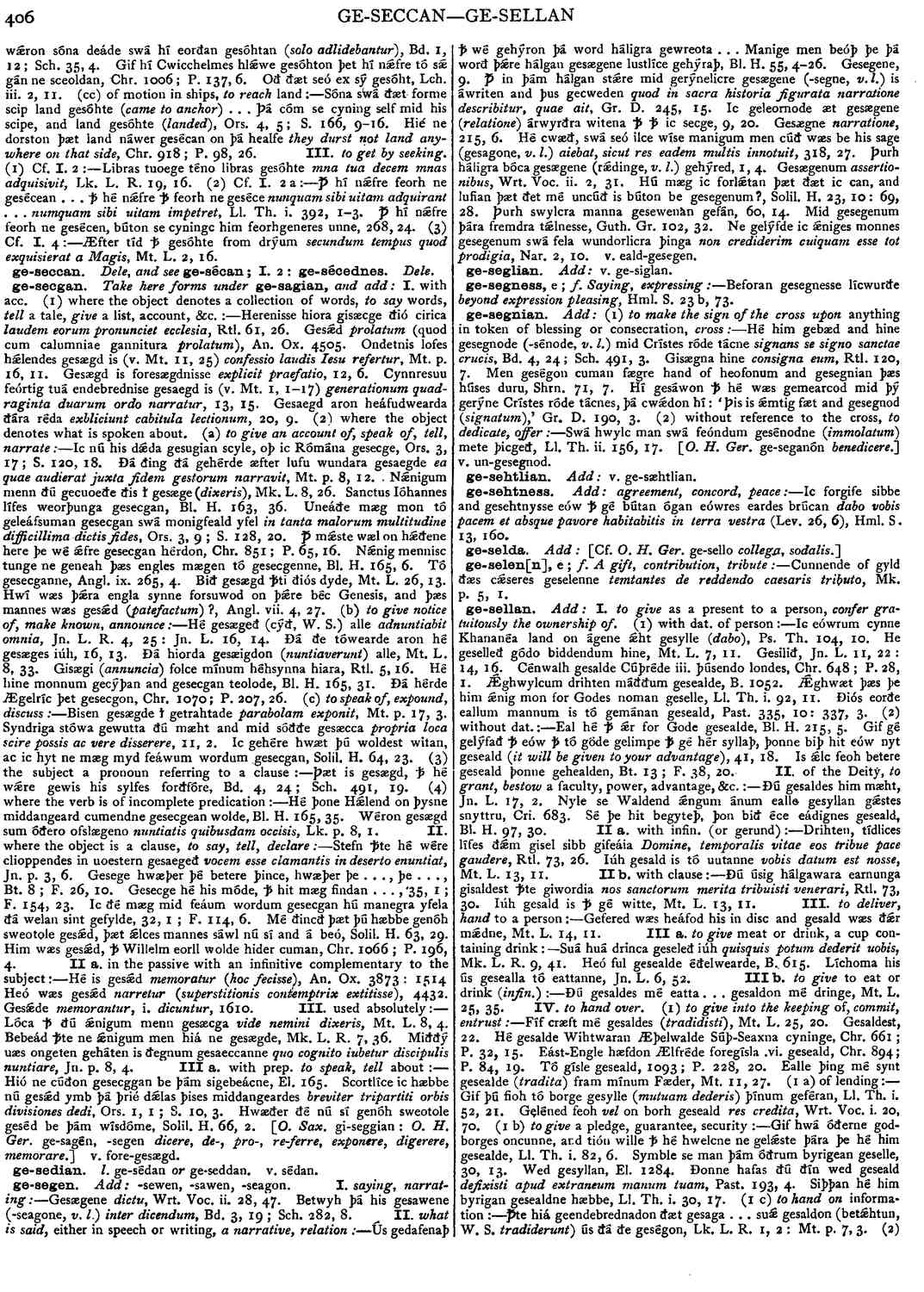ge-secgan
-
Herenisse hiora gisæcge ðió cirica
laudem eorum pronunciet ecclesia,
- Rtl. 61, 26.
-
Gesǽd
prolatum (quod cum calumniae gannitura prolatum ],
- An. Ox. 4505.
-
Ondetnis lofes hǽlendes gesægd is (v. Mt. II, 25) confessio laudis Iesu refertur. Mt. p. 16, ll. Gesægd is foresægdnisse
explicit praefatio,
- 12, 6.
-
Cynnresuu feórtig tuá endebrednise gesaegd is (v. Mt. l, 1-17)
generationum quadraginta duarum ordo narratur,
- 13, 15.
-
Gesaegd aron heáfudwearda ðára réda
exbliciunt cabitula lectionum,
- 20, 9.
-
Ic nú his dǽda gesugian scyle, oþ ic Rómána gesecge,
- Ors. 3, 17; S. 120, 18.
-
Ðá ðing ðá gehérde æfter lufu wundara gesaegde ea quae audierat juxta fidem gestorum narravit, Mt. p. 8, 12. . Nǽnigum menn ðú gecuoeðe ðis ł gesæge
(dixeris),
- Mk. L. 8, 26.
-
Sanctus Ióhannes lífes weorþunga gesecgan,
- Bl. H. 163, 36.
-
Úneáðe mæg mon tó geleáfsuman gesecgan swá monigfeald yfel
in tanta malorum multitudine difficillima dictis fides.
- Ors. 3, 9 ; S. 128, 20.
-
Þ mǽste wæl on hǽðene here þe wé ǽfre gesecgan hérdon,
- Chr. 851; P. 65, 16.
-
Nǽnig mennisc tunge ne geneah þæs engles mægen tó gesecgenne,
- Bl. H. 165, 6.
-
Tó gesecganne,
- Angl. ix. 265, 4.
-
Bið gesægd ꝥti ðiós dyde,
- Mt. L. 26, 13.
-
Hwí wæs þǽra engla synne forsuwod on þǽre béc Genesis, and þæs mannes wæs gesǽd
(patefactum)
?,- Angl. vii. 4, 27.
-
Hé gesægeð (cýð, W. S.) alle
adnuntiabit omnia,
- Jn. L. R. 4, 25 : Jn. L. 16, 14.
-
Ðá ðe tówearde aron hé gesæges iúh,
- 16, 13.
-
Ðá hiorda gesæigdon
(nuntiaverunt)
alle,- Mt. L. 8, 33.
-
Gisægi
(annuncia)
folce mínum héhsynna hiara,- Rtl. 5, 16.
-
Hé hine monnum gecýþan and gesecgan teolode,
- Bl. H. 165, 31.
- Ðá hérde Ægelríc þet gesecgon. Chr. 1070; P. 207, 26.
-
Bisen gesægde ł getrahtade
parabolam exponit,
- Mt. p. 17, 3.
-
Syndriga stówa gewutta ðú mæht and mid sóððe gesæcca
propria loca scire possis ac vere disserere,
ii. 2. - Ic gehére hwæt þú woldest witan, ac ic hyt ne mæg myd feáwum wordum gesecgan. Solil. H. 64, 23.
-
Þæt is gesægd, ꝥ hé wǽre gewis his sylfes forðfóre,
- Bd. 4, 24; Sch. 491, 19.
-
Hé þone Hǽlend on þysne middangeard cumendne gesecgean wolde,
- Bl. H. 165, 35.
-
Wéron gesægd sum óðero ofslægeno
nuntiatis quibusdam occisis,
- Lk. p. 8, I.
-
Stefn þte hé wére clioppendes in uoestern gesaegeð
vocem esse clamantis in deserto enuntiat,
- Jn. p. 3, 6.
-
Gesege hwæþer þé betere þince, hwæþer þe . . . , þe . . . ,
- Bt. 8 ; F. 26, 10.
-
Gesecge hé his móde, ꝥ hit mæg findan . . . ,
- 35, I; F. 154, 23.
-
Ic ðé mæg mid feáum wordum gesecgan hú manegra yfela ðá welan sint gefylde,
- 32, l ; F. 114, 6.
-
Mé ðincð þæt þú hæbbe genóh sweotole gesǽd, þæt ǽlces mannes sáwl nú sí and á beó,
- Solil. H. 63, 29.
-
Him wæs gesǽd, ꝥ Willelm eorll wolde hider cuman, Chr. 1066 ; P. 196, 4. II a. in the passive with an infinitive complementary to the subject :-- Hé is gesǽd memoratur (hoc fecisse), An. Ox. 3873: 1514 Heó wæs gesǽd
narretur (superstitionis coniemptrix extitisse),
4432. -
Gesǽde
memorantur, i. dicuntur,
1610.
-
Lóca ꝥ ðú ǽnigum menn gesæcga
vide nemini dixeris,
- Mt. L. 8, 4.
-
Bebeád þte ne ǽnigum men hiá ne gesægde,
- Mk. L. R. 7, 36.
-
Miððý uæs ongeten geháten is ðegnum gesaeccanne qua cognito iubetur discipulis nuntiare, Jn. p. 8, 4. III a. with prep.
to speak, tell
about :-- Hió ne cúðon gesecggan be þám sigebeácne,- El. 165.
-
Scortlíce ic hæbbe nú gesǽd ymb þá þrié dǽlas þises middangeardes
breviter tripartiti orbis divisiones dedi,
- Ors. l, l ; S. 10, 3.
-
Hwæðer ðé nú sí genóh sweotole geséd be þám wísdóme,
- Solil. H. 66, 2.
Bosworth, Joseph. “ge-secgan.” In An Anglo-Saxon Dictionary Online, edited by Thomas Northcote Toller, Christ Sean, and Ondřej Tichy. Prague: Faculty of Arts, Charles University, 2014. https://bosworthtoller.com/49613.
Checked: 0